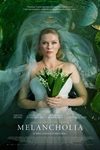- REVIEW
- READER REVIEWS
Melancholia
|
|
Genre
Drama, SciFi/Fantasy, Suspense/Thriller
Distributor
Magnolia Pictures
Release Date
Nov 11, 2011
Release Notes
NY/LA
Official Website
Review
Only an egomaniac like Lars von Trier could turn the notion of a planet on a collision course with Earth into a metaphor for his own depression, and only a mad genius could make it sing. Melancholia, which is also the name of the party-crashing planet, is a lyrical ode to the end of the world�a world Von Trier plainly loathes, in which family can’t protect you, marriage is a sham, and capitalism poisons all. The vision is as hateful as it is hate-filled, but the fusion of form and content is so perfect that it borders on the sublime.
The film is two large acts and a stunning, slow-motion prologue scored to Wagner’s Tristan und Isolde, before Von Trier repeats the same bars so often they wear out their welcome. Birds drop, one after another, from the sky. A bride (Kirsten Dunst) emerges from a forest trailing leaves and vines. A mother (Charlotte Gainsbourg) runs with a child in her arms across an ominously darkened golf course, never making headway. In a view from outer space, another world (Melancholia) slowly smashes into a smaller one (ours). How can Von Trier follow that?
With a wedding. The film’s first section, a flashback, is called �Justine� after its bride (Dunst), a palpably depressed ad copywriter engaged to a palpably uninteresting but handsome man (Alexander Skarsgård). They’re getting hitched on a lavish country estate courtesy of John (Kiefer Sutherland), the wealthy husband of Justine’s sister, Claire (Gainsbourg), but after their limo gets stuck, they’re hours behind schedule. For a while, Melancholia plays like one of those nightmares in which time stretches maddeningly out and nothing is ever consummated, the vibe not just bad but rank. Justine’s father (John Hurt) is a drunken lech who’s barely present, while her misanthropic mother (Charlotte Rampling) is all too there, her wedding toast a curse on the institution of marriage. Justine’s noxious boss (Stellan Skarsgård) orders a hapless underling (Brady Corbet) to dog her for a tagline to an ad campaign, but the bride is elusive. Now she’s in the stable with a precious horse, now out of her dress in the tub while people wait and wait to cut the cake, now on the lawn seducing someone other than her husband. Justine explodes her world before our eyes�as a prelude to the world itself exploding.
The second section, �Claire,� has much less drama, being a long wait for the end in which John stares into a telescope and insists that Melancholia will pass by Earth, Claire becomes increasingly agitated, and Justine feels her heart beginning to lighten. It’s as if the sisters were trading places, the stable one racked with grief, the mad one serene. Dunst’s Justine is less naked, more self-possessed than you’d expect from a Von Trier heroine (his lead actresses usually look as if they’re being tortured), but it’s the self-possession of a woman who has more or less stopped fighting her tragic worldview. Gainsbourg, having been broken in by Von Trier on Antichrist, goes with evident ease to the worst place inside herself and makes the last scenes quake with fear. Sutherland gives the film’s most unexpected superb performance. Famously intense on the set of 24 (to which his drunken antics offscreen were a corollary), he plays John as a man so tightly wound that the first indication of calamity breaks him.
In the final scenes, Von Trier the Wagnerian emerges, moving inexorably closer to the Big Bang without ever accelerating, drawing out the long melodic line until you feel as if your heart might burst along with the planet. It’s a cruel but strangely comforting climax. What can you do but surrender to Melancholia?
Cackle, I guess. People did at my screening, when the director’s credit finally appeared after a postapocalyptic interval of darkness and silence. Believe me, I wanted to join in. But Von Trier’s vision is too fully realized to laugh off. Having moved with Antichrist out of his kindergarten-Brecht formalist stage, he’s back to rough textures and open frames, but with a new control. Melancholia is a raw psychodrama with the unnerving drone of Tarkovsky’s Solaris, its angst giving birth to the ultimate cosmic correlative. It’s a great, awful movie, a nihilist masterwork that settles over you like a shroud.
